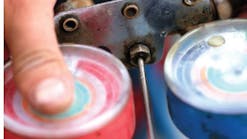Condensing units often fall victim to contamination and complete compressor failure when placed in greasy, dirty environments, or those with extremely high temperatures.
Older compressors in harsh environments suffer from internal contamination, which causes acid and moisture to collect in the system, which ultimately results in a costly compressor failure.
When contractors are called in to fix the problem, we’re often asked to provide a solution at minimum cost, which can put us in a difficult situation; should we propose the customer purchase a new condensing unit, or apply a less favorable, “band aid” solution — one that may risk their good reputation?
Symptom of a larger problem
Some customers believe that retaining an older condensing unit and simply replacing the worn compressor component will be less expensive than replacing the entire unit. This is rarely the case, as it generally takes longer to add a new compressor than to install a new condensing unit.
Cost aside, the compressor is likely not the only worn out component. A compressor failure is often a symptom of a larger problem, and other components may be barely functional and close to failure.
New equipment lasts longer
Simple logic dictates that a new condensing unit should last longer than an older, repaired system. Even if a contaminated system is cleaned and repaired, the average technician might not be able to completely clean the entire unit, due to difficulty in accessing it. A condensing unit might be positioned against a wall, or there could be something else preventing the technician from reaching it.
At Atlanta Refrigeration, we’ve learned from experience that replacing entire condensing units is the best option for our customer base, which is comprised of restaurants, hotels, and some convenience stores.
By replacing the unit, you know it will work, because you’re eliminating the problem that made it fail in the first place.
Saving time and money
Nothing is more beneficial for your reputation than to come to a customer’s rescue, with a solution that saves money. When working with food service customers looking for a quick, cheap fix, it’s best to ask the customer to step back and think “big picture.”
By replacing the entire condensing unit, the customer receives a contaminant-free system that will deliver peak performance out of the box and for years to come.
Our supplier, Johnstone Supply, agrees. Tony Ghokasian, Copeland product manager with Johnstone Supply, says that replacement actually reduces the end-user’s cost. He adds that a new system prevents repeat problems down the road, and eliminates time spent having to take care of other repair issues associated with equipment age.
Reduced risk of inventory loss
When an older system is repaired, but all problems are not fully addressed due to poor system access, it’s only a matter of time before the system fails again. If this happens, the end user runs the risk of food spoilage. Therefore, the option of complete replacement is again a more viable solution for the customer.
Remember, the customer wants the problem to be fixed right the first time, so that we don’t have to come back. They don’t want to risk the loss of revenue. With new condensing units, there is a much lower chance of system failure, which ultimately translates into keeping the end user from losing inventory and revenue.
And, a new condensing unit comes with a new fan motor, condenser coil, and electrical components, all covered by the new product warranty. This saves the customer and contractor a lot of time and headaches by reducing future problems and a contractor callback.
The wisdom of preventive maintenance
The Atlanta Refrigeration website —
www.atlantarefrigeration.com — carries the following statement:
“The most common causes resulting in equipment replacement are caused from issues that could have been prevented through routine maintenance.”
In line with that philosophy, Atlanta Refrigeration makes preventive maintenance agreements mandatory with every account.
We like to use this illustration to help customers understand why we do this: If you have a fleet of 100 trucks, you’re most likely going to have a maintenance program in place to take care of them. Much like changing the oil or rotating your tires, preventive maintenance is something you have to do.
The successful sale of an entire condensing unit is a win-win situation for all involved. The end users are satisfied because it works, and they can sleep easy knowing that they have fresh warranties and a trustworthy contractor to rely on.
The contractor also wins, knowing that he’s done the right thing for his customer, and that he won’t be getting a callback.
Dave Brautigan is president of Atlanta Refrigeration, a 38-year-old, second-generation commercial refrigeration company. Atlanta Refrigeration’s 55 employees serve restaurants, hotels, and other commercial establishments in north Georgia. Brautigan’s “tools of the trade” include Copeland compressors, and Emerson moisture indicators, controls, motors, and filter driers. He can be reached at 770/352-9222.







